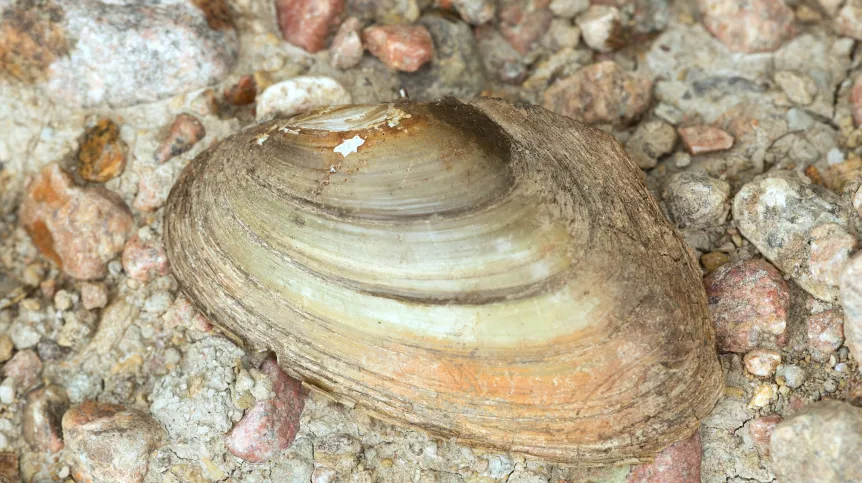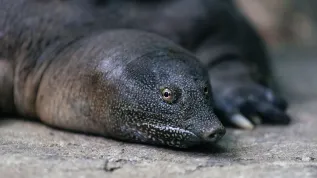
A project devoted to studying the causes of the mass extinction of freshwater mussels and their ability to adapt to climate change, taking into account, among other things, the impact of water temperature, pathogens and microbiome, is one of 11 projects from Poland to receive funding from the Swiss National Science Foundation.
In total, 334 applications from all over the world were submitted to the MAPS - Multilateral Academic Projects competition. In the field of life sciences, funding was awarded to eight projects, including one submitted by Tadeusz Zając, PhD, a professor at the Institute of Nature Conservation of the Polish Academy of Sciences, in collaboration with Alexandra Weber from Switzerland and Professor Jasna Leitner from Croatia.
Freshwater mussels are among the most endangered groups of aquatic animals in the world. Although they have managed to adapt perfectly to life in rivers and lakes for millions of years, today their numbers are rapidly declining - also in Europe. Scientists want to investigate the specific biological mechanisms are behind this disturbing phenomenon. .
'Mussels have achieved incredible evolutionary success and the extinction of such an old and widespread group is very worrying, especially that it concerns freshwater animals, which indicates an ecological crisis in the entire ecosystem', Zając says.
He reminds that until recently, mussels constituted a large part of the biomass of aquatic organisms, and today they are disappearing at an alarming rate. Scientists observe both gradual declines in their numbers, and mass extinctions, such as the one that took place in the Oder in 2022.
The problem is particularly visible in North America, because the largest number of species from this group of animals occurs there, but it has also intensified in Europe to the extent that practically all large freshwater mussels, the so-called naiads, have already been added to the European Red List of Threatened Species.
According to the researcher, it is clear that the main cause of the extinction of mussels is climate warming, resulting in increased water temperatures in rivers around the world. 'This is not good for aquatic organisms, but there are many indications that in the case of mussels, the increase in temperature is not a direct cause. We have often had to deal with water temperatures exceeding 30 degrees Celsius, in which mussels did not die in such large numbers and directly because of this', Zając points out.
Therefore, as part of the FACEMUSSEL project, he will not only observe the problem, but also try to determine what exactly happens in the body of mussels and in their environment when entire populations die.
The scientist suspects that one of the reasons may be a change in the microbiome associated with mussels, related to river warming. 'Humans have their own intestinal and skin microbiome, and mussels have theirs. As environmental conditions change, the microbiome also changes. Some observations indicate that a different composition of the bacterial biome and the increased occurrence of mussel pathogens, including completely new ones, may reduce the natural resistance of these organisms', the expert explains.
The new project also involves research on the phenotypic plasticity of mussels. This is one of the basic mechanisms of adaptation of organisms to new environmental conditions, encompassing a number of morphological, physiological and behavioural changes, even though the genotype remains unchanged.
The research team members plan to combine data from environmental monitoring with advanced genetic and physiological studies. This will allow them to check how different populations react to stress related to warming and whether they have the ability to adapt.
'We will look for genes that are activated in response to environmental changes in different populations of mussels. When we manage to describe all these genetic mechanisms responsible for the response to stress, we may find out whether and how mussels are able to compensate for the adverse effects of rising water temperatures', the scientist says.
In addition to Polish rivers, Croatian rivers will also be examined as part of the project. 'Until recently, our mussels lived in colder, well-oxygenated waters, which provided ideal conditions for them. Croatian mussels have always had to cope with warmer water, so they may be more resistant', Zając explains.
In his opinion, the extinction of mussels observed in recent years has become such an alarming problem that it needs to be looked at more closely. 'It is not enough to say that the temperature has warmed, so mussels are dying. We want to find out what mechanisms are behind this. Mussels have a very important role in the ecosystem - they filter water, support biodiversity, stabilise sediments. In addition, they are long-lived organisms, with a low replacement of generations. So if 1/3 of the population disappears every year, and there are no young ones, it slowly leads to the gradual extinction of the entire group', he concludes.
The MAPS-funded project is titled 'Multifaceted approach to understanding freshwater mussel and resilience in the face of global warming - FACEMUSSEL'.
PAP - Science in Poland, Katarzyna Czechowicz (PAP)
kap/ bar/ ktl/













